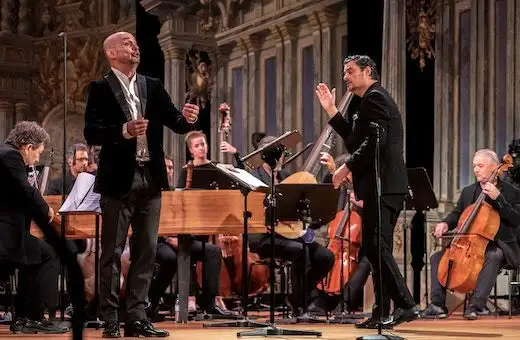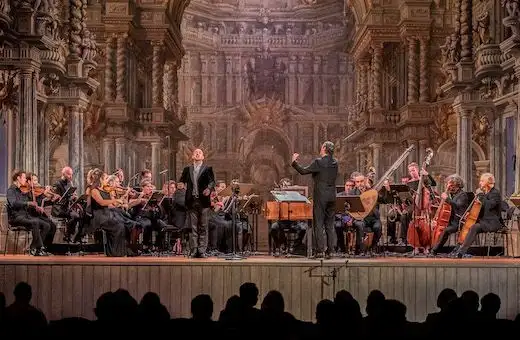
Franco Fagioli, George Petrou and Armonia Atenea
Leonardo Vinci's music revived by Franco Fagioli at Bayreuth Baroque
Among the composers of the Neapolitan School of the 18th century, very few left such a recognisable mark as Leonardo Vinci,
who gave his operas a dramatic flair made of passion and imagination.
The Englishman Charles Burney, while visiting Italy to collect materials
for his A General History of Music, wrote that “Italians did
not want to see again any piece that they had already seen unless it is
some excellent opera by Vinci.” 
Vinci created poignant melodies and virtuoso pieces with overflowing inventiveness, and he composed for the legendary castrato Farinelli, among others. When he was 40, his opera Artaserse premiered in Rome bringing him the greatest triumph of his life, after which he suddenly died – allegedly poisoned by a jealous husband.
Today, the main specialist in the Vinci's repertoire, at least for the last ten years, is Franco Fagioli,
one of the greatest countertenors of his generation, possibly the best
in terms of vocal prowess and virtuosity. Fagioli presented some of the
most beautiful Vinci’s arias in a recital entirely dedicated to the
Neapolitan composer at the Bayreuth Baroque Opera Festival 2021, a Gala
held at the Margravial Opera House under the baton of George Petrou, who conducted the Baroque ensemble Armonia Atenea.
Fagioli displayed his elaborate vocalism with glamorous allure. His timbre sounded as beautiful and his technique as impressive as ever. The audience in the hall was very impressed by his highly emotional performance and virtuoso coloratura passages. His countertenor voice was whole-hearted and charming, full of sincere emotion. His mezzo-soprano timbre shone effortlessly and was stunning, without the harshness we may hear in some of his other countertenor colleagues. He could also reach a high range and tessitura with superb breath control.
The aria “Quell’usignolo ch’è innamorato” came in like a breath of fresh air, and was striking for its vocal charm, exhibited with naturalness. “Fra cento affanni”(from Artaserse) was an exhibition of Baroque brilliance. Arias from Siroe, Il Medo, and Catone in Utica all showed Fagioli’s gift for nuances and detail, and the ease with which he sang bravura passages. His versatility was also amazing in “Nave altera, che in mezzo all’onde” from Gismondo re di Polonia.


Δεν υπάρχουν σχόλια:
Δημοσίευση σχολίου